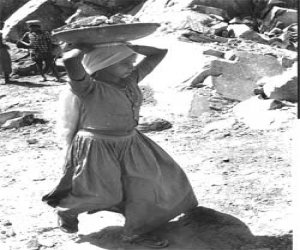
The Times of India, New Delhi.
Monday, July 13, 1992,
NEW DELHI: Most laws on child labour are merely on paper. Implementation is almost nil, regrets the former Chief Justice of India, Mr. P.N. Bhagwati. Inaugurating the First South Asian Consultation on carpet child labour here yesterday, Mr. Bhagwati said, "we already have enough legislation on child labour". "It is high time the governments of the day ensure child labour in the carpet industry is completely eliminated". The three-day meet is organised by the Committee for Eradication of child Labour in Carpet Industry and Asian culture forum on Development.
We need to build public opinion against this form of child labour he stresses. It is a great tragedy that governments do not realise the inhumanity they are perpetrating, he says. These children lead a helpless and hopeless life, with lost eyesight and sunken cheeks. Hunger has taken away life from them, he notes. The law prohibits any child below 14 years to work.But is it enforced?The subject is heart-rending. It breaks one's heart to see these children forced to work for 14 to 20 hours a day, notes Mr. Bhagwati.
"They dare not protest. They are not allowed to move, not even to case themselves". And these are future citizens of our country, Don't they have the same aspirations as others? Have they no right to partake of the fruits of freedom and liberty? Has society given anything to them.? he asks. They should be given full opportunity for the development of their potential, the former Chief Justice advocates.
'NO NEED FOR FOREIGN HELP: Mr. Bhagwati welcomes the participation of Nepal and Pakistan with India in the Consultation meet. "If concerted action is taken in these three countries, a combined public opinion can be created. One country then cannot say the other is not doing it," he adds. Plus we do not need foreign assistance to fight this form of child labour.
On an optimistic note, he says " I am sure we'll be able to eradicate child labour, once public opinion is mobilised. If we could remove the British from our roll, why not this?"
The director, Anti-slavery International, London, Ms Lesley Robberts, says the problem of child labour in South Asia could take their entire time. "No legislation can help, only changes in attitude can, "she notes,. She says "We still await the UN's plan for a seminar on bonded labour, since 1990."
There should be an awareness campaign against child-woven carpets, she notes. Importers of carpets should be the target. A label on carpets saying it was made without child labour will have wide impact on consumers, she notes. In some European countries, people look for labels certifying the buying has been from responsible producers and suppliers - those who provide fair remuneration and conditions of employment, including employees' right to organise and paying a fair price.
THREE LAKH KIDS: Today, there are three lakh children employed in the carpet trade, notes Swami Agnivesh, president of Bandhua Mukti Morcha. We have a responsibility towards them. In 1984, the government accepted there was child labour but whether it was bonded labour was a legal question, it said, he regrets. These children are from the scheduled castes, scheduled tribes and backward classes. But if they were children of ministers or officers or even the upper caste only then there would be an uproar, he said.
There are five and a half crore children in servitude putting in 10 hours work in our country. "If our children were vote banks, politicians would have done something about them. Today no one fights for them".
Swami Agnivesh hits out at Doordarshan and all India Radio. How much of time do these two devote to these children? The former can show Wimbledon for hours even when there is no play. But for these children what does it do? It is a sick society, notes Agnivesh. He denies calling for a boycott of Indian carpets. "We only say buy carpets but demand a label that it is not produced by children. We must strive towards producers using such labels, genuine ones. This is possible," he adds.
India, Pakistan and Nepal are among the largest producers and exporters of hand-knotted carpets, roughly two-thirds of the total world market, says Mr. Kailash Satyarthi convenor of the consultation.